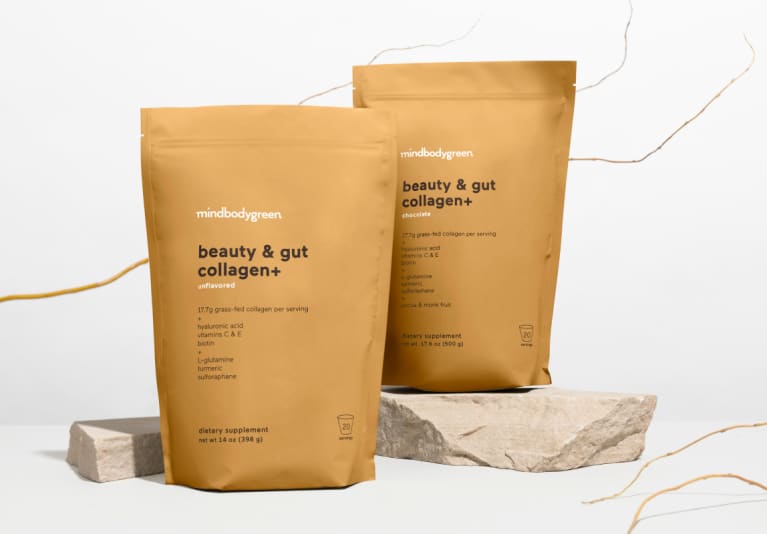The Best (& We Mean Best) Ways To Restore Collagen In The Face
Oh boy is collagen important for skin health.*


November 5, 2021 — 18:04 PM
Collagen is the most abundant structural protein in the body and skin. And, oh boy, is it important if you care about healthy aging and skin care.* Its gradual and natural decline over the years is what contributes to what we consider signs of aging: fine lines, sagging, sallowness, loss of volume, and more. It's no wonder that people are constantly looking for ways to "restore" their natural levels.
Here, we look into why collagen declines and the most effective (and natural) ways to support your own levels of this protein in the skin.*
What does collagen do for the body & skin?
beauty & gut collagen+
The one-step routine to support youthful skin, strong hair & a healthy gut*

As we noted, collagen is a structural protein naturally found in the body. There are several types of collagen, but types I, II, and III are the most common in the human body. Collagen is found in many areas of the body: skin, bone, cartilage, and muscle, with the purpose of helping tissues be simultaneously more firm, elastic, and withstand stretching.* So, for example, it keeps skin looking young and supple.* For a full explainer on the role of collagen in the body, check out our guide, which dives into the details more thoroughly.
Do you need to restore collagen?
Here's the good part: Your body makes its own supply of collagen via fibroblasts (assuming the amino acid building blocks are present from your diet). Essentially, these cells take amino acids (the constituents of protein) that we ingest and then turns them into protein.
The bad part is that this process slows over time. "Our bodies always balance collagen production and degradation," says board-certified dermatologist Gary Goldenberg, M.D., assistant clinical professor of dermatology at the Icahn School of Medicine at Mount Sinai in New York about collagen decline. "When we are young, our bodies produce more collagen than we break down. That balance tips the wrong way with age since tissue regeneration decreases."
As a snapshot of collagen production in your life, we actually see the process peak in your 20s. Then at some point in that precious decade, the decline begins. The exact point is different for everyone, but typically mid- to late 20s is a good bet. After that, your collagen declines at a steady rate of 1% per year, every year. For those who go through menopause, collagen takes another drop during that time: They experience a 30% drop in collagen during that time frame, and then that stabilizes to an about 2% decline every year thereafter.
Additionally, your collagen can also take a hit from natural lifestyle factors like UV exposure, stressors, and diet.
Now that you've been briefed on why you should pay attention to your natural collagen levels, let's look into the ways in which you can enhance them. As an overview, there are several routes to take when it comes to collagen support—and, as always, we recommend taking care of your skin from all angles.*
Collagen supplements have become a popular tool for skin health and longevity.* They're made of collagen peptides, or short-chain amino acids, that are more easily absorbed by the body.* Once absorbed, they are able to travel around the body, exerting their beneficial effects: Research shows they are able to enhance your body's own collagen production by stimulating fibroblasts, those same cells that make collagen and elastin to begin with.*
With skin, you might expect results like better hydration, smoother skin, and improved skin quality.* For example, clinical research has shown that collagen can support skin elasticity and potentially make fine lines appear smaller.* And a double-blind, randomized, placebo-controlled clinical trial found that participants' moisture levels in the skin were seven times higher than those who did not take collagen supplements.*
Of course, not all collagen supplements are created equal. It's imperative that you find a quality manufacturer that is transparent about their sourcing, excipients, amino acid profile, and the amount of collagen actually in the product.
Additionally, there are other nutrients you can take that support your collagen production through other pathways. While this isn't an exhaustive list, here are some of the most efficient options to look for:

"I see improvement in my complexion and my skin is smooth and soft"*
Julie W., Verified Buyer of collagen+
Skin care products are an excellent way to spur collagen production—not to mention they offer some of that immediate gratification that is oh-so-rewarding. When you are looking to improve collagen production with topical products, using collagen is actually not the way to go. Collagen and collagen peptides are too large to be absorbed effectively by the skin (unlike the gut), and thus don't affect the natural collagen level. However, some actives have been shown to boost collagen production:
While supplementation provides a targeted approach to collagen support, your day-to-day diet is the foundation upon which this is built. Ideally, you're eating a robust diet with a wide variety of nutrients—and one that doesn't spur inflammatory processes in the body. For collagen specifically, you can also consume foods that have an amino acid profile themselves such as chicken (with skin on), lean meats, lentils, and so on. You should also consume foods high in vitamins C and E (for collagen synthesis and cross-linking), a variety of nutrient and phytonutrient antioxidants (to protect your collagen layer), and essential minerals, like zinc (which also play a role in protein production). Finally, you may want to avoid high-sugar diets, which have been linked to hardening and fragmentation of collagen in the skin.
For a full list on how to eat for collagen support, check out our guide.
This is less about production and more about making sure the collagen you do have remains stable, but there are several things you can do to make sure your collagen levels remain healthy. As I often say: Everything is skin care.
For more tips, visit our guide to producing collagen naturally.
If you are pregnant, breastfeeding, or taking medications, consult with your doctor before starting a supplement routine. It is always optimal to consult with a health care provider when considering what supplements are right for you.

beauty & gut collagen+
The one-step routine to support youthful skin, strong hair & a healthy gut*
beauty & gut collagen+
The one-step routine to support youthful skin, strong hair & a healthy gut*

https://www.mindbodygreen.com/articles/how-to-restore-collagen-in-the-face

 ValVades
ValVades 
































